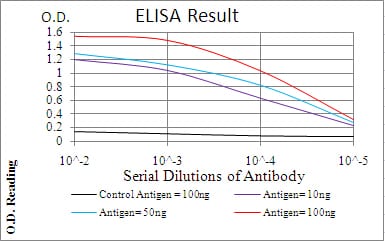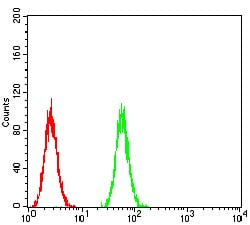

| WB | 咨询技术 | Human,Mouse,Rat |
| IF | 咨询技术 | Human,Mouse,Rat |
| IHC | 咨询技术 | Human,Mouse,Rat |
| ICC | 技术咨询 | Human,Mouse,Rat |
| FCM | 1/200 - 1/400 | Human,Mouse,Rat |
| Elisa | 1/10000 | Human,Mouse,Rat |
| Aliases | GPCR1; GPR86; GPR94; P2Y13; SP174; FKSG77 |
| Entrez GeneID | 53829 |
| clone | 3E8C12 |
| WB Predicted band size | 40.8kDa |
| Host/Isotype | Mouse IgG1 |
| Antibody Type | Primary antibody |
| Storage | Store at 4°C short term. Aliquot and store at -20°C long term. Avoid freeze/thaw cycles. |
| Species Reactivity | Human |
| Immunogen | Purified recombinant fragment of human P2RY13 (AA: 1-49) expressed in E. Coli. |
| Formulation | Purified antibody in PBS with 0.05% sodium azide |
+ +
以下是关于P2RY13抗体的示例文献摘要(内容为模拟概括,建议通过学术数据库核实具体文献):
---
1. **文献名称**:*P2RY13 receptor modulates microglial immune responses and promotes neuroprotection*
**作者**:Moore CS et al.
**摘要**:研究利用P2RY13特异性抗体,揭示了该受体在小胶质细胞中的表达及其在调节神经炎症中的作用,发现激活P2RY13可减少促炎因子释放并促进吞噬功能。
2. **文献名称**:*P2RY13 regulates high-density lipoprotein metabolism and atherosclerosis*
**作者**:Jacquet S et al.
**摘要**:通过抗体验证P2RY13在肝脏和巨噬细胞的分布,证明其通过调节HDL摄取影响胆固醇代谢,抗体阻断实验表明其与动脉粥样硬化病理相关。
3. **文献名称**:*Development of a selective P2RY13 antibody for functional studies in immune cells*
**作者**:Müller CE et al.
**摘要**:报道了一种高特异性P2RY13抗体的开发,验证其在流式细胞术和免疫组化中的应用,并证明该受体在单核细胞活化中的调控作用。
4. **文献名称**:*P2RY13 activation attenuates neuroinflammation via cAMP-PKA signaling*
**作者**:Li X et al.
**摘要**:利用抗体检测P2RY13在脑组织中的表达,揭示其通过cAMP信号通路抑制小胶质细胞过度活化,为神经退行性疾病治疗提供潜在靶点。
---
建议通过PubMed、Google Scholar等平台以关键词“P2RY13 antibody”、“P2RY13 receptor function”检索最新文献,或参考《Journal of Biological Chemistry》《Glia》等期刊的相关研究。
The P2RY13 antibody targets the P2Y purinoceptor 13. a G protein-coupled receptor (GPCR) belonging to the P2Y receptor family. P2RY13 is activated by extracellular nucleotides, primarily adenosine diphosphate (ADP), and signals through Gi/o proteins, inhibiting cAMP production. It plays roles in immune regulation, neuroprotection, and metabolic processes, such as lipid metabolism and apoptosis. Expressed in immune cells (e.g., microglia, macrophages), the central nervous system, and peripheral tissues, P2RY13 is implicated in modulating inflammatory responses and cellular homeostasis.
Antibodies against P2RY13 are essential tools for studying its expression, localization, and function. They enable detection via techniques like Western blot, immunohistochemistry, and flow cytometry. Research using these antibodies has linked P2RY13 to diseases including neurodegenerative disorders (e.g., Alzheimer’s), metabolic syndromes, and cancer. For instance, P2RY13 activation in microglia may influence neuroinflammation, while its role in cholesterol efflux highlights potential connections to atherosclerosis.
Validation of P2RY13 antibodies often involves knockout controls or siRNA-mediated silencing to confirm specificity. Challenges include cross-reactivity with related P2Y receptors due to structural homology. Recent studies also explore therapeutic targeting of P2RY13. emphasizing its dual pro- and anti-inflammatory effects depending on context. Overall, P2RY13 antibodies are critical for unraveling the receptor's complex roles in health and disease.
×